France Slams Five-Year Sentence For Citizen Held In Iran
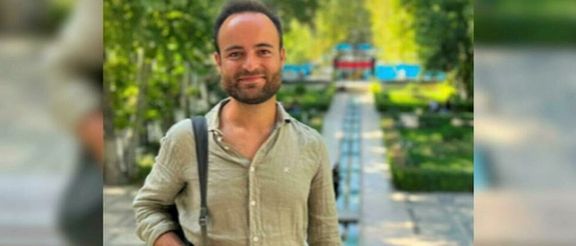
Paris has decried Iran sentencing a French national to five years in prison on a baseless conviction, calling for his release and three other of its nationals held by Tehran.

Paris has decried Iran sentencing a French national to five years in prison on a baseless conviction, calling for his release and three other of its nationals held by Tehran.
"We learned with the greatest concern that Mr. Louis Arnaud had been sentenced to five years in prison," Foreign Ministry spokesperson Anne-Claire Legendre said in a statement.
"This conviction, for which there is nothing to support and the absence of any access to a lawyer, is unacceptable."
Ties between France and Iran have been strained over the issue in what Paris has said are arbitrary arrests that are equivalent to state hostage taking.
Arnaud, who has been held since September 2022, is one of four French nationals held in Iran, and is being detained at the Evin prison in Tehran.
His mother, Sylvie, told Reuters the pretext given for his sentencing were for "propaganda and harming the security of the Iranian state."
"These are completely baseless and a carbon copy of what they attribute to other Europeans held in Iran," she said.
In recent years, Iran's elite Revolutionary Guards have arrested dozens of dual nationals and foreigners, mostly on charges related to espionage and security.
Rights groups have accused Iran of trying to extract concessions from other countries through such arrests. Iran, which does not recognize dual nationality, denies taking prisoners to gain diplomatic leverage.
(Report by Reuters)
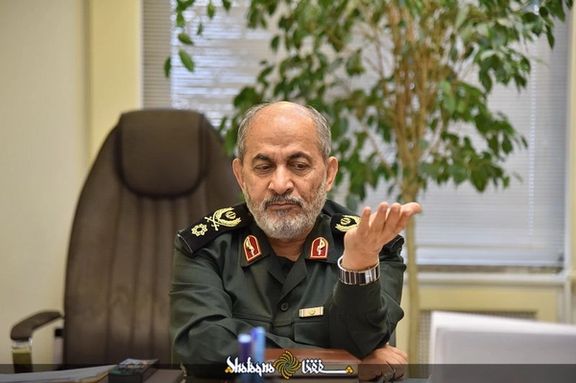
Mohsen Rafighdoust, the first IRGC minister, has claimed that Iran possesses hostages from major world powers.
In an interview in local media, he said in the event of an attack on Iran, “the Islamic Republic has the capability to eliminate the hostages within a mere half-hour.”
While he has no current official role, and Iranian officials may deny or distance themselves from his remarks. Iran has recently exchanged five US hostages in exchange for the release of $6bn of frozen Iranian funds in South Korea. However, the regime consistently claims that it does not take or hold hostages.
It is unknown how many diplomatic hostages are being held in Iran but high profile cases have revealed the systematic policy of the regime to detain dual-nationals in return for political leverage.
In a related development, an Iranian court on Wednesday sentenced French national Louis Arnaud to a five-year prison term. Arnaud, who has been detained since September 2022 and faced trial on national security charges, was convicted in a Revolutionary Court on charges of “promoting propaganda against and attempting to undermine the security of the Islamic Republic.”
The Arnaud family strongly contests the charges, asserting his innocence and condemning the verdict as a violation of human rights and individual freedoms.
Louis Arnaud's family described him as a “passionate traveler” who had longed to visit Iran, only for his dream to turn into a nightmare as he was unjustly targeted, imprisoned, and now convicted on what they deem “baseless charges.” They maintain that he had no political intentions during his time in Iran and had distanced himself from the social movements that erupted in September 2022.
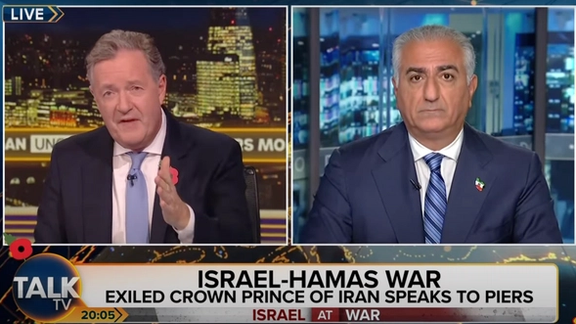
Iran’s exiled prince says to counter Islamist extremist threats such as Iran's proxy Hamas in Gaza, the world must cut their source of support from Tehran.
Appearing in Piers Morgan Uncensored on Sky News Australia Tuesday, Reza Pahlavi reiterated the call on the global community to differentiate between Iranian people and the Islamic Republic's regime, saying that what the people of Iran want is “totally different” from the “radical” regime in their country.
He said the world cannot ignore the elephant in the room, referring to how the Islamic Republic is the main engine behind a wide range of conflicts, elaborating that since its establishment in 1979, the Islamic Republic has fomented “antagonism, regional instability, warmongering” through supporting terrorist groups.
Stating that the cure for the extremism fueling terrorist groups was to end it at the source, which is the Islamic Republic. “I’ve always asked the world community, including the media when they talk about Iran, to specify they are talking about the regime in Iran, not the people," he explained.
“The principal support and the principal funding that comes to these (terrorist) groups must have a money trail … it is not a secret that the regime in Tehran has been behind most of these groups, has financed them, has armed them, has used them as proxies,” he said.
Stressing the threat this poses to the West, including the recent revelation in The Times in London that Tehran was backing mass pro-Palestine protests in London, and stoking unrest in Europe, he added: “Today we hear this ominous sound of radical Islamists who are trying to shape a different future for countries even in Europe.The cure is to put an end to the source behind this extremism.”
In addition to its web of proxies across the Middle East, Iran has also been found to be supplying arms to Russia in its invasion of Ukraine, showing the breadth of the threat posed by the regime's war-mongering elite. Since mid-2022, Iran has reportedly supplied a substantial number of kamikaze Unmanned Aerial Vehicles (UAVs) to Russia, which have been extensively deployed to target civilian infrastructure and cities.
The former crown prince, who has long campaigned for a secular and democratic Iran rather than a restoration of the monarchy, has time and again talked about how the collapse of the Islamic Republic and the establishment of a new government in Iran that is at peace with the world can resolve a plethora of international conflicts. He enjoys a large supporter base in Iran and abroad with no gathering held without people chanting slogans in admiration of the Pahlavi monarchs, who were pioneers of leading Iran to its modernization. A Revolutionary Guard official revealed this week that imprisoned protesters expressed a desire for the return of the exiled prince to Iran.
Pahlavi made the remarks amid an escalating conflict in the Middle East, ignited on October 7, when Tehran-backed Hamas Islamist militants launched a multi-thronged attack into Israel, killing over 1,400 mostly civilians and taking more than 240 hostages. Thousands of Palestinians have been killed in Israel's retaliatory bombardment in the most serious conflict since Hamas took control of the Strip in 2007.
The Islamic Republic has been trying to indoctrinate the Iranian people with anti-Israel notions and its attempts start since the early years at elementary schools where students must shout “death to Israel and the US” before going to the class every morning. Since war broke out, around 40 attacks have also been made on US bases in Iraq and Syria as the regime capitalizes on the opportunity to expand the conflict beyond Gaza.
However, amid the wave of pro-Palestinian rallies across the world, hardliners in Iran are admitting that the general public in Iran have little appetite for the Palestinian cause. Iran has seen no grassroot, popular expression of solidarity with Palestinians, except by groups loyal to the regime despite the fact that the Islamic Republic of Iran is the main supporter of Hamas – or perhaps because of it.
Even on the streets of London where some 100,000 people at a time have come out in pro-Palestine marches, Iranians have made their voice heard.
Since the Hamas terror operation it codenamed al-Aqsa Flood (Storm in Persian), Iranians have become even more vocal about their distance from the Islamic Republic’s narrative of the conflict, making trendy hashtags like #IranStandsWithIsrael or chanting creative slogans about where the regime should put the Palestinian flag. Public events such as football matches, are a good touchstone to see the real public mood of Iranians, who use such events to chant slogans against the regime’s pro-Hamas propaganda.
Earlier this week, people set fire to a pro-Hamas billboard in the religious city of Mashhad, where the Supreme Leader and President Ebrahim Raisi hail from. Setting fire to billboards and monuments promoting the Islamic Republic’s lines of propaganda has become another way Iranians express their desire to break free from the rule of the Islamic theocracy. A large number of Iranians also stand with the people of Israel but do not dare to express their opinions openly in fear of reprisal by the regime.
It is time for many under the regime to break free of not only its control of how to dress, but also from the confines of how they must think. According to an Iranian anti-regime activist, “Iranians risk their life to stand by the people of Israel” because they have been “prisoners of these terrorists and their propaganda for 45 years!”
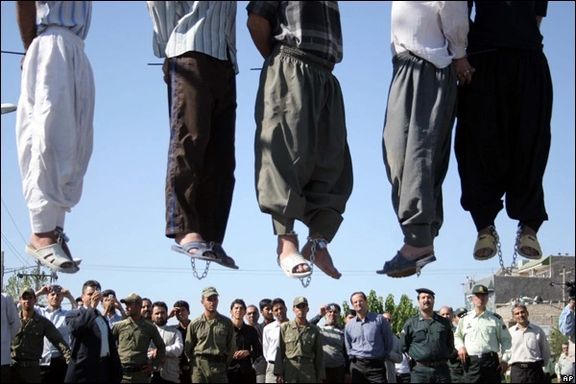
A group of nine Iranian prisoners has reportedly been executed in Ghezel Hesar Prison in Karaj, west of the capital Tehran.
The executions were carried out in the early hours of Wednesday morning, with the prisoners facing a range of charges, including murder, drug-related offenses, and armed robbery.
Of the executed prisoners, two have been identified as Bahman Fat’hollahzadeh and Rasoul Teimouri, who were imprisoned on drug-related charges.
What adds to the gravity of the situation is that the execution of the prisoners has not been officially announced by prison authorities or responsible organizations, categorizing them as "secret executions” as reported by the US-based Human Rights Activists News Agency (HRANA).
Group executions have been previously documented in Ghezel Hesar Prison in Karaj, including the execution of six prisoners on Thursday, November 1, and the execution of 10 prisoners on October 18.
Simultaneously, the Hengaw Human Rights Organization reported the execution of another prisoner in Kermanshah Prison, located in the western part of Iran. He was identified as Farhad Aghaie, 32, who had previously been sentenced to execution on charges of murder.
Following the amendment of the drug control law in 2017, under international pressure, the number of drug-related executions in Iran had decreased to an average of 26 cases per year. However, in 2021, the trend was reversed, resulting in a notable increase in such executions.
Amnesty International's recent report said from January 1, 2012, to July 31, 2023, over 5,000 individuals, including at least 57 children, have been either executed or sentenced to death in Iran.

Amnesty International has issued a warning regarding the potential execution of Reza (Gholamreza) Rasaei, a detainee linked to last year's nationwide protests in Iran.
The international human rights organization reports that Rasaei, hailing from Iran's marginalized Kurdish and Yarsan ethnic and religious minorities, has allegedly been subjected to torture.
The Yarsan faith, also known as Ahl-e Haqq, is among the oldest Middle Eastern religious traditions, with an estimated three million followers in Iran, primarily in the western Kurdish regions, and an additional 120,000 to 150,000 in Iraq, known as Kaka'i.
Yarsan adherents have encountered various challenges, including difficulties in registering their children as Yarsan at birth, restrictions on constructing places of worship, and the constant fear of persecution for printing their holy book.
According to Amnesty's report, Rasaei underwent an "unfair trial" on October 7 in Kermanshah province, during which he was convicted of "murder" and subsequently sentenced to death, with his forced confessions tainted by torture serving as evidence.
Amnesty says Rasaei was convicted of involvement in the killing of an agent, identified as a member of the Revolutionary Guards by Iranian state media, during a protest in Sahneh, Kermanshah province, on November 18, 2022. Rasaei vehemently denies any involvement. Additionally, he was convicted of "disrupting public order" and sentenced to one year in prison along with 74 lashes.
Amnesty International has called upon Iran's Chief Justice, Gholamhossein Mohseni Ejei, to "immediately quash the conviction and death sentence against Rasaei."
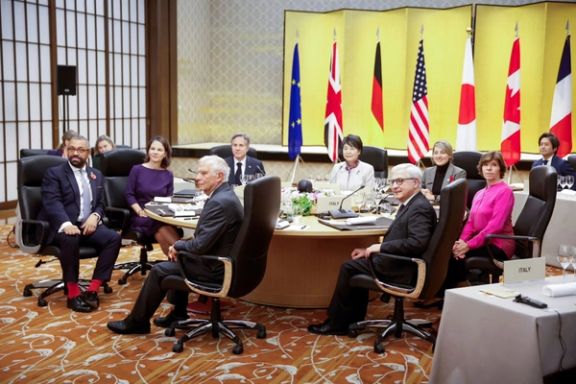
The Group of Seven (G7) nations have issued a call to Iranian authorities urging them to cease their support for Hamas and Hezbollah amid the war in Gaza.
In a joint statement released on Wednesday following a two-day meeting in Tokyo, foreign ministers from G7 countries underlined the critical need for Iran to refrain from providing assistance to Hamas and from taking actions that could further destabilize the Middle East.
"We call on Iran to refrain from providing support for Hamas and taking further actions that destabilize the Middle East, including support for Lebanese Hezbollah and other non-state actors," the foreign ministers of the G7 countries noted, referring to the network of proxies Iran has across the Middle East.
It comes while Israel and Hamas are engaged in the worst Gaza war since the Iran-backed proxy took over control of the strip in 2007 following the Hamas invasion of Israel on October 7. In one day Hamas claimed responsibility for the slaughter of 1,400 mostly civilians and a further 241 taken hostage to Gaza. Lebanese Hezbollah, Iran's biggest regional proxy on Israel's northern border, has been carrying out increasing attacks since the war began in the worst violence since the second Lebanon war.
US Secretary of State Antony Blinken and his counterparts from Britain, Canada, France, Germany, Japan, and Italy reiterated their unwavering support for Israel's right to self-defense and the protection of its citizens in accordance with international law.
In response to the attacks on October 7, the Israeli military has conducted a sustained series of airstrikes in Gaza. The Hamas controlled health ministry in Gaza has claimed that the death toll on their side has now surpassed 10,300.